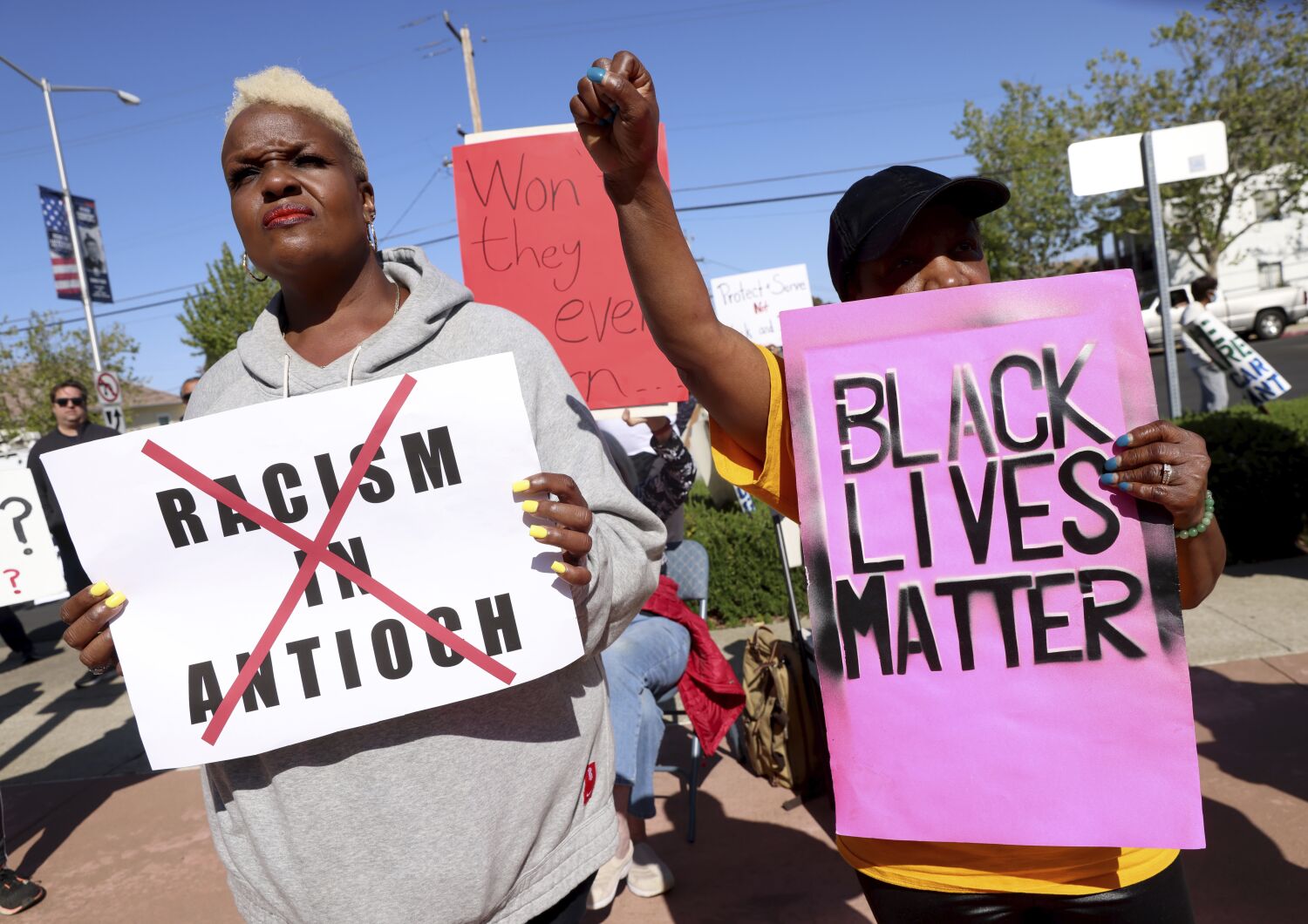Can California cops be fired for racism? The reply is shocking
[ad_1]
Just a few weeks in the past, the Contra Costa County district legal professional launched the outcomes of an investigation that discovered as much as 40% of law enforcement officials in Antioch, a Bay Space enclave with a majority of nonwhite residents, have been linked to a racist textual content messaging chain.
Calling Black folks “monkeys” and “gorillas” wasn’t the worst of it. The messages, spanning over a multiple-year interval, used the N-word repeatedly and joked about concentrating on folks primarily based on pores and skin shade. They could find yourself documenting civil rights violations primarily based on race.
Underneath a brand new state legislation, the California Legislation Enforcement Accountability Reform Act, also referred to as Meeting Invoice 655, such hate speech could also be an offense that requires termination — if substantiated.
Many police don’t know in regards to the legislation, stated Ed Obayashi, a lawyer and Plumas County sheriff’s deputy who advises legislation enforcement departments statewide on social media misconduct. And most of them, he added, don’t perceive what its full implications is perhaps.
Obayashi advised me he has been attempting to get his colleagues to concentrate to the CLEAR Act however hasn’t had a lot luck.
The scandal in Antioch might — lastly — get their consideration. If town of Antioch tries to self-discipline its officers utilizing the CLEAR Act, it could set a precedent for future instances and curtail our tolerance of hate behind a badge.
The CLEAR Act was written to fight extremism in legislation enforcement and root out officers who’re members of identified hate teams. However Obayashi and the invoice’s writer, San Jose Democrat Ash Kalra, contend that six phrases within the new legislation that prohibit “advocacy of public expressions of hate” broaden it to incorporate rather more than becoming a member of up with the Proud Boys or hanging with neo-Nazis. Obayashi believes the intent of the legislation, which went into impact Jan. 1, is easy: “Any racist bias, you’re looking at obligatory terminations.”
A spokesperson for the state Division of Justice stated in an e-mail that the division is engaged on the specifics of the laws. Antioch chief of police, Steven A. Ford, didn’t reply to an e-mail in regards to the CLEAR Act.
Racist habits involving legislation enforcement stays surprising however hardly shocking. Each few months, it appears as if a brand new shame bubbles up like sewage from a damaged pipe.
In August, my colleague James Queally reported on one such incident in Torrance when an officer used the N-word whereas texting one other officer about members of the family who have been protesting the capturing of a younger Black man, Christopher Deandre Mitchell.
Over the previous few years, police and sheriff’s departments, together with some in San Francisco, Oakland, Berkeley, San Jose, Eureka and Sacramento, have confronted comparable issues.
And naturally, there’s Los Angeles County, the place deputy gangs within the Sheriff’s Division, with their not-so-secret tattoos (a really clear type of communication), have value town about $55 million in lawsuits, in keeping with a 2020 report by the Brennan Middle for Justice.
A few of these officers have been fired. Some weren’t. Till AB 655, the foundations weren’t express and allowed departments to largely impose their chosen self-discipline. However the CLEAR Act is definitive; if an officer has been discovered to be in violation, the division has no selection however to fireplace them.
Like, say, officers repeatedly utilizing racial slurs whereas on responsibility patrolling a various neighborhood. These Antioch textual content messages, even when shared on private telephones, have little expectation of privateness, Obayashi argues. And as soon as public, they’ll set off an investigation below the CLEAR Act that may look at the whole lot that officer has stated or accomplished in public for seven years.
Obayashi teaches officers that their 1st Modification rights don’t defend them from their obligations as peace officers. Making racist or hateful remarks in any discussion board — Fb, Twitter, texts — is dangerous policing.
“For those who do that, I don’t care if you’re racist or not, you’re too silly to be a cop,” he stated.
Kalra, the invoice’s writer, advised me “the intent was definitely to root out officers that maintain the sort of attitudes that officers in Antioch maintain.”
The racial slurs, the misogyny, the disdain are all indicators of extremism, he stated. Even when the officers within the textual content chain aren’t explicitly in a hate group, their actions are harmful due to the facility they maintain.
“It’s undoubtedly extremist views after we contemplate what the function of a police officer is,” Kalra stated.
And for a number of the Antioch officers, it seems as if that hatred might have gone past phrases. Among the texts consult with officers utilizing extreme drive or concentrating on people primarily based on race. Together with a federal lawsuit by some Antioch residents focused within the texts, one other Latino couple has filed a lawsuit claiming they have been attacked by officers primarily based on their race.
After all, the officers concerned within the Antioch scandal are entitled to due course of. Mike Rains, who represents each the Antioch Police Officers’ Assn. and a number of the particular person officers implicated within the scandal, stated he doesn’t imagine the CLEAR Act applies to one thing like a textual content messaging chain as a result of it isn’t related to a hate group or a selected hate crime.
“Even whether it is abhorrent, even when it has issues that sound hateful on its face about an individual, about race, I don’t suppose that qualifies in and of itself,” he stated.
He additionally believes that the Antioch officers who acquired the messages however didn’t actively take part within the texting chain shouldn’t be judged in the identical method as these pushing the dialog and that their silent presence shouldn’t be interpreted as settlement.
“These officers are those that pay a fairly extreme worth merely for being on a textual content chain,” Rains stated.
Proper now, he stated, most departments in California don’t have guidelines requiring officers to report biased or racist statements from their colleagues — which looks like one thing we should always demand, simply as we insist that officers intervene after they see extreme drive.
John Burris, a civil rights legal professional representing some Antioch group members within the federal lawsuit, doesn’t suppose passivity is exonerating.
“You get no credit score for silence,” he stated.
How far the CLEAR Act stretches might depend upon how far police chiefs and sheriffs need it to go. In the event that they proceed to attempt to sweep bias below the rug, possibly the legislation means little. However that old-school method has turn into a dropping tactic each for leaders who need to maintain their jobs, and for many who really care about bringing a brand new and completely different breed of officer into the fold — which many accountable chiefs need to do.
Regardless of being a decades-long defender of police in courtrooms and within the public sphere, Rains says legislation enforcement is in hassle in the case of hiring due to its status for bias and misconduct, and might’t recruit sufficient good folks. Scandals like Antioch “drag the entire occupation down.”
Working example: The homepage for Antioch Police Division is principally a job advert, providing a $30,000 signing bonus.
Departments, particularly in California, are below super stress to reform and rebuild belief with communities which can be fed up with biased policing. Alison Berry Wilkinson, a lawyer who usually represents officers in disciplinary hearings, stated that the CLEAR Act is solely a continuation of a pattern she is already seeing of departments now not with the ability to tolerate bias.
Like Senate Invoice 2, one other reform measure that for the primary time permits California to decertify officers for severe misconduct in order that they’ll’t maintain a badge wherever within the state, it’s the codification of public will.
“It’s a transparent assertion of what’s already happening,” she advised me. “People who’ve these beliefs, who’re expressing hate within the method of these textual content messages, they don’t belong on this trade.”
If legislation enforcement leaders can use the CLEAR Act to set expectations — and possibly even clear home of an outdated and ugly mind-set — then it’s a legislation that must be used to its fullest intent.
Beginning in Antioch.


